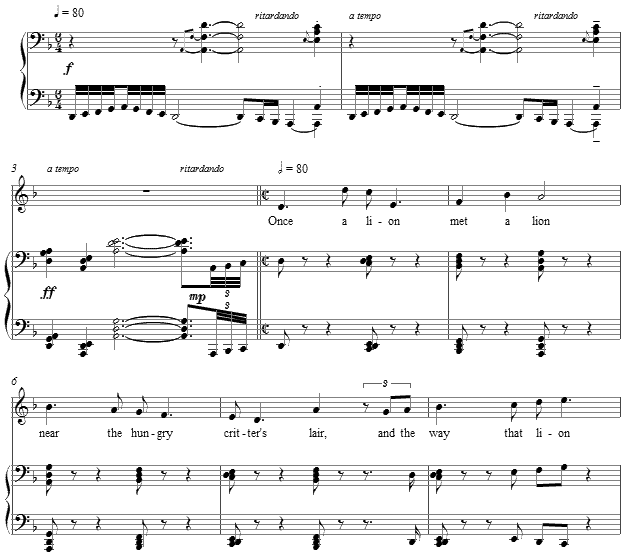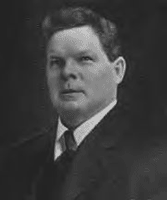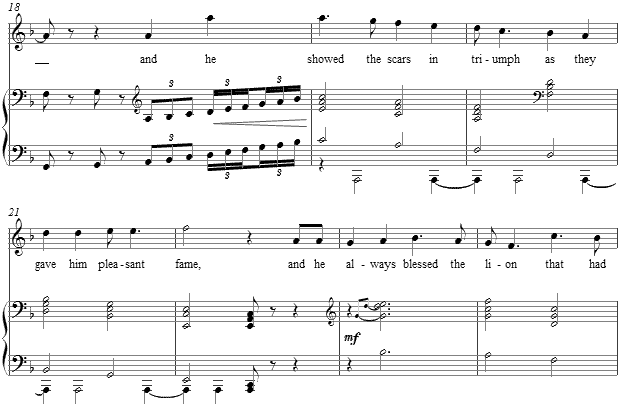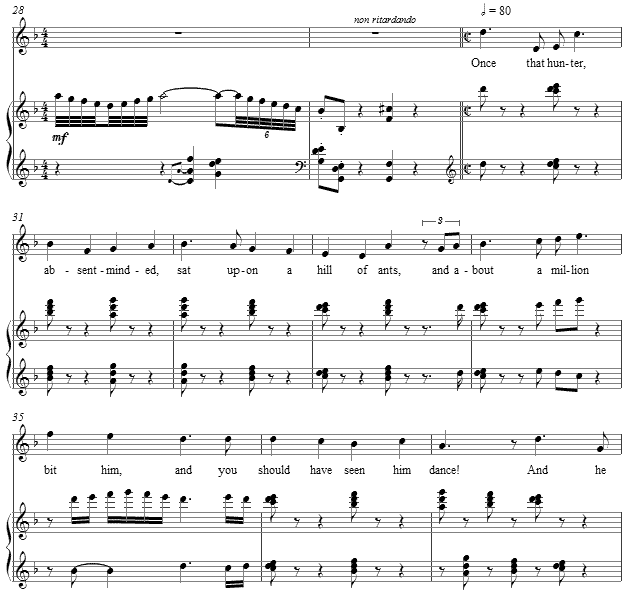Music and Texts of GARY BACHLUND
Vocal Music | Piano | Organ | Chamber Music | Orchestral | Articles and Commentary | Poems and Stories | Miscellany | FAQs
Lions and Ants - 2006
Walt Mason
for tenor or baritone and pianoOnce a hunter met a lion near the hungry critter's lair, and the way that lion mauled him was decidedly unfair; but the hunter never whimpered when the surgeons, with their thread, sewed up forty-seven gashes in his mutilated head; and he showed the scars in triumph, and they gave him pleasant fame, and he always blessed the lion that had camped upon his frame. Once that hunter, absent minded, sat upon a hill of ants, and about a million bit him, and you should have seen him dance! And he used up lots of language of a deep magenta tint, and apostrophized the insects in a style unfit to print. And it's thus with worldly troubles; when the big ones come along, we serenely go to meet them, feeling valiant, bold and strong, but the weary little worries with their poisoned stings and smarts, put the lid upon our courage, make us gray, and break our hearts.
from Walt Mason: His Book [1911]
[ Six pages, circa 2' 20" ]
Walt Mason
Originally a Canadian, Walt Mason (1862 - 1939) became an American citizen and was a newspaper writer and humorist. Mason, familiarly known as "Uncle Walt," is the Emporia, Kansas, poet, whose inimitable wit has brought him national reputation. William Allen White, editor of the Emporia Gazette, some years ago called Mr. Mason the "Poet Laureate of American Democracy," and admirers of Mr. Mason's work have voiced their approval of the title. While Mason restricted himself almost wholly to the writing of prose poems, he did considerable other newspaper writing. For a time he was connected with the Washington, D. C., News. His books, called Uncle Walt's Book, and his Rhymes of the Range, were very popular. What follows is his own autobiographic sketch:
"I was born at Columbus, Ontario, May 4, 1862. My parents were poor. I was the fifth of a series of six sons. My father was a dyer in a woolen mill, and was accidentally killed in that establishment when I was four years old. He was Welsh and my mother of Scotch descent. My mother was fond of books and poetry and old songs, and knew many of the latter. She died when I was fifteen years old. Meanwhile, during my childhood, I had been going to a country school, and working for farmers, and also in the woolen mill. After my mother's death I went to Port Hope, Ontario, and worked in a hardware store for a year and a half, drawing the princely salary of two and a half dollars a week and boarding myself. When I was nine or ten years old I was nearly drowned, and was hauled out of the water, unconscious, by an older brother. I have had defective hearing ever since, and it is probably due to this that I never became a merchant prince. Anyhow, I was not a success in a hardware store, and when I told my employer I was going to leave, he said it was the proudest and happiest moment of his life. Having severed my diplomatic relations with the hardware man, I crossed Lake Ontario, in 1880, going to New York state, where I hoed beans for a summer. It was the poorest fun I ever struck. The soil was stony, and the hoe was dull, and the sun was as hot as blazes, and there didn't seem to be any sense in hoeing beans, anyhow. From New York I took my way westward, arm in arm with the star of empire. I stopped a while in Ohio, then in Illinois, and finally reached St. Louis, where I went to work in a printing establishment and 'kicked' a job press through the hottest summer ever invented. There was a humorous weekly, called the 'Hornet,' in St. Louis, and I sent some stuff to it. The 'Hornet' printed it, and the editor wrote to me and asked me to call. He offered me five dollars a week to go to work in the office, writing gems of thought, reading proofs, sweeping the floors, and otherwise making myself useful. I took the job and remained with the 'Hornet' until it went broke. Not being able to get another job in St. Louis, I went to Kansas and worked around the state for three years as a hired man. Disgusted with that sort of work, and being ambitious to get into newspaper business, I managed to get a job with the 'Leavenworth Times.' Later I became a reporter on the 'Atchison Globe,' and there learned a great deal that was useful to me. From that time forward I was chasing myself over the country, and was connected with newspapers in a dozen cities, but always had the idea that the next town would be a little better, and kept moving around. I was mixing up farming with newspaper work in Nebraska for a good many years, and making a failure of both. It took me a good while to discover that pigs and poetry won't mix. When I did find it out I came to Kansas, and went to work for William Allen White, writing stuff for the editorial page of the 'Emporia Gazette.' The 'Gazette' always printed on its first page an item of local news with a border around it, called a star-head. One day the city editor was shy of the necessary item, and asked me to write something to fill that space. I wrote a little prose rhyme, advising people to go to church next day, which was Sunday. The prose rhyme attracted some attention, and on Monday I wrote another one, and a third on Tuesday, and so on, and the star-head rhyme became a feature of the 'Gazette.' Thus originated the prose poem."
tessitura for high voice
The setting opens with a roar -- and ends with a lesson well worth heeding. The opening gesture in the tonic minor should be harsh and rhapsodic, and introduces a disjunct vocal line declaiming the opening scenario.

The dramatic rise of the vocal line to its height shouts out the triumphant braggadocio of the so-called victim, as he claims it to himself.
Quite like the first strophe and yet with an accompaniment placed three octaves higher, the "million" ants manage to do what the single lion could not. Now the "roar" of the lion is placed in the soprano voice of the accompaniment and becomes seemingly less threatening, all the while the threat is in some ways greater for exposing the folly of man.
The score for Lion and Ants in high and medium keys is available as a free PDF download, though any major commercial performance or recording of the work is prohibited without prior arrangement with the composer. Click on the graphics below for this piano-vocal score.
Tessitura for medium voice


